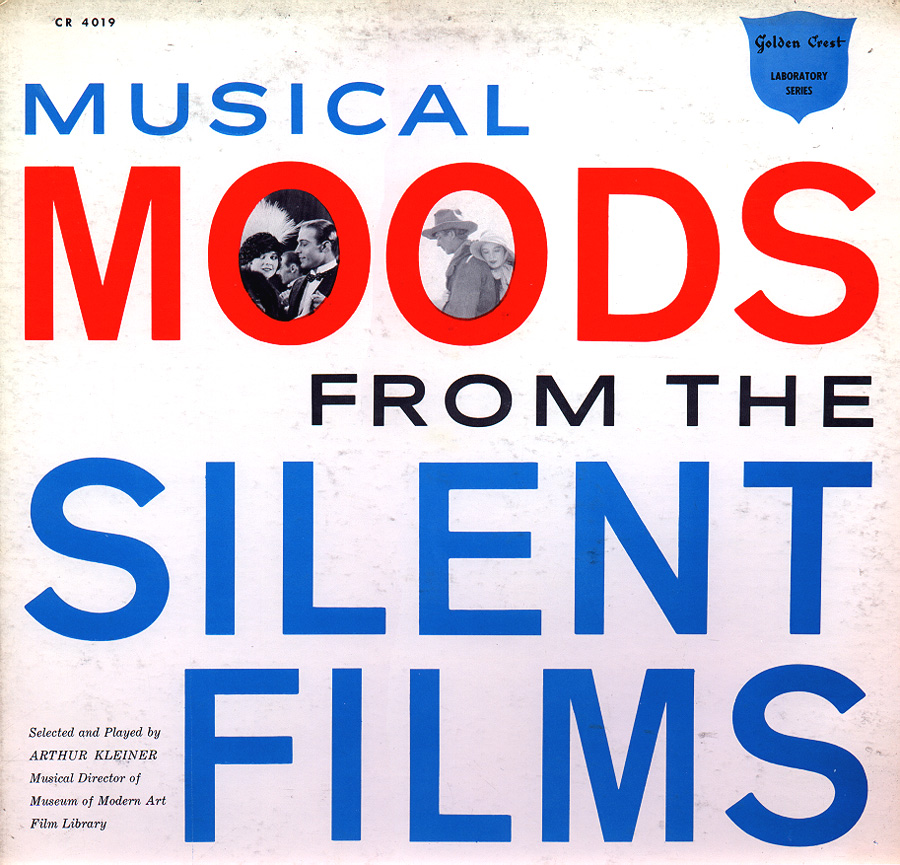When I was in college, I played for a silent film course taught by MoMA’s Charles Silver. Charles loaned me a few LPs to listen to, since I was new to this. One of the records was Musical Moods from the Silent Films, by Arthur Kleiner. When I gave the album a spin, I realized this was not my first encounter with this music.
This would’ve been sophomore year at NYU, the first year I played for films. Second semester (I remember a lot of winter weather). Charles was teaching a course at Bridgeport University, back when it was known for having an excellent film program. I’d preview the films at MoMA’s Film Study Center, on a 16mm Steinbeck, and would travel by train with Charles to Connecticut.
Charles loaned me a small book that Charles Hoffman had put together on silent film music during the year he was an accompanist at MoMA. Charles (Silver) also loaned an LP of silent movie organ music by Gaylord Carter and the Arthur Kleiner record.

Musical Moods is comprised mostly of silent era mood music cues. Agitatos, mysteriosos, love themes, etc. It includes a few original melodies by Arthur Kleiner himself, themes he’d written for Charlie Chaplin and Harold Lloyd comedies. But when I heard the track of “The Philanderer” I thought “a-ha! So that’s where that came from!”
Like the Robert Youngson compilations like When Comedy Was King, but on a more local level, many silent film aficionados in the NY-NJ-CT area are familiar with a show that ran on PBS (Channel Thirteen WNET for us) in the early 1970s called The Silent Comedy Film Festival. It was a series of programs of silent comedy shorts put together by Herb Graff, William K. Everson and Walter Kerr. Perhaps it ran elsewhere in the country; I don’t know.
But I remember the show and the films on it, and especially the music. Because it seemed to be this one record of piano music that got needle-dropped to fit the films. And as I listened to Arthur Kleiner playing mood cues on that Golden Crest record ten years later, I recognized it as being the music I had stowed in the recesses of my silent comedy film memory.
One mood cue in particular, the “Philanderer” piece by Bertram Srawley that I mentioned above, had stuck in my head all those years. I figured out how to play it from the record, and used it in some of the comedy shorts I played for the following fall in the NYU class Robert Sklar taught.
There were a few others I recognized from the Herb Graff show, some of which I re-encountered about ten years ago when doing research for the Music of the Silent Films sheet music book I was working on. I wound up selecting a couple of them for inclusion in the book. I figured, if Arthur Kleiner thought they were good and used them, they should be in this collection.
Arthur Kleiner had been MoMA’s full-time silent film accompanist from 1939-1968 and spent many years filling filing cabinets in his office at the museum with mood music cues and other sheet music that he’d use in compiling and arranging his silent film scores. The LP was sort of a “greatest hits” of these, I’m guessing, recorded for the Golden Crest label.
With the 10-week Modern Matinees: Iris Barry’s History of Film series about to start at MoMA, I’ve been doing some research about Arthur Kleiner and his work at the museum. I’ll share some of what I’ve turned up in blog posts over the coming weeks.
- Fun fact: the Golden Crest label’s master tapes are now at the Library of Congress.
- There is a copy of the complete orchestral arrangement for Bertram Srawley’s “The Philanderer” in a collection at the library of Middle State Tennessee University
- The Jim Lochner book The Music of Charlie Chaplin lists the cue sheet selections for The Circus, as compiled by Ernst Luz, which include a few of Srawley’s pieces
